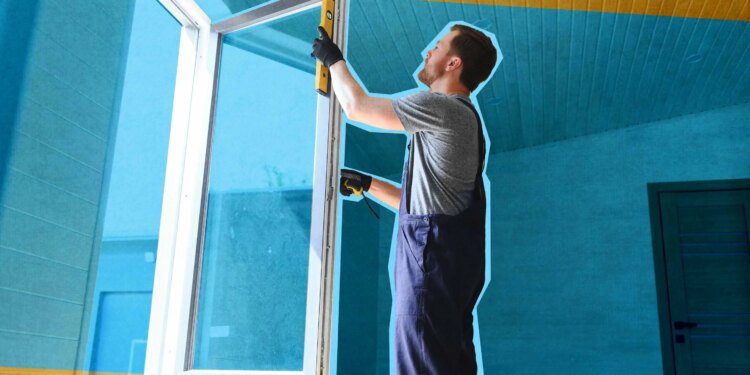If you’re preparing to sell your home, you may be eyeing its old windows and wondering if it’s worth replacing them before hanging out the For Sale sign. As with much else in life, the answer is a solid maybe.
There’s no question that new windows add appeal to a home, and the improved insulation they deliver can boost comfort and lower energy costs. And, yes, home buyers value them, too: According to real estate technology platform HomeLight, turnkey properties — those that require little to no repairs or renovations, typically sell faster than those requiring more work.
Still, it’s important to weigh the potential benefits against the costs, and avoid overspending on an improvement to a home you won’t be living in much longer. Here are some tips to help guide your decision.
Inspect your windows
Sussing out the condition of your current windows is step number one. You have little choice but to replace them if they’ve got broken frames, don’t open or close correctly or are too drafty to keep the home at a comfortable temperature.
If none of those conditions apply, you might be able to improve the appeal of your windows with some minor repairs or upgrades. Applying solar film to older windows can increase energy efficiency at a fairly modest cost. (About $20 to $200 per roll, depending on the film’s properties.) Solar film is made of thin layers of plastic or polymers and can improve heat retention in cold climates or reflect heat in hot weather, depending on the type, helping lower heating and cooling costs.
Other cost-saving measures include sanding and repainting chipped or faded wooden frames
and filling in gaps in your windows’ caulking or weather stripping. These measures can be time consuming, though, and require tools and materials you may not have lying around. And while replacing only broken or faulty windows can save money, it can also affect the home’s appearance — and a buyer’s opinion of it — if the repairs create a patchwork of styles or materials that clash with the existing windows.
Choose the right materials
Materials profoundly affect the cost of replacing windows and the curb appeal they add to your home. Here’s a quick rundown of two frequently used window materials, with notes on their pros, cons and how much value they add to your home.
Vinyl windows
A set of ten 3×5 foot, double-hung vinyl windows has an average replacement cost of $21,264. The resale value added is $14,270, which means you’ll recover about 67% of the original costs when you sell the home, according to Remodeling Magazine’s 2024 Cost vs. Value report.
Pros:
- Less expensive than wood windows
- Better ROI
- Require little to no maintenance
Cons:
- Less durable
- Can warp over time
- May not be available in unique shapes or sizes
- Not eco-friendly
Wood windows
Replacing wood windows is more expensive, with an average national cost of $25,799 for the same number and size of windows as above. The resale value is $16,222, which means you’ll recover nearly 63% of the original cost, according to Remodeling Magazine.
Pros:
- Long-lasting
- Can be repainted and refinished
- Recyclable
Cons:
- Require occasional maintenance (like regular oiling or waxing)
- Susceptible to rot, water damage and warping
- Lower ROI
Of course, the actual replacement cost will depend on how many new windows you install and their size. If you want high-end or custom-built windows, as can be the case with historic homes, you can expect costs to be much higher. Consult with window experts to get cost estimates using different materials to see how big a budget you’ll need.
New windows or not?
The cost-to-resale-value calculations above confirm that new windows for your soon-to-be-sold home are not a no-brainer, at least financially. That said, window upgrades can increase your home’s value in other ways, too.
Move-in appeal
One of the primary value-adds is improved curb appeal — a modern and well-kept home is a selling point for prospective buyers seeking a property that doesn’t require significant renovations.
Energy savings
Installing energy-efficient windows can reduce your monthly utility bills. According to the U.S. Department of Energy, replacing older windows with energy-star-rated ones can reduce heating and cooling costs by 7% to 15%, resulting in annual savings between $70 and $500.
Soundproofing
Busy neighborhoods can be noisy. Replacing older, single-pane glass with laminated, double, or triple-pane windows helps keep out unwelcome sounds.
Home security
Burglars looking for an easy score often look at windows to see how easy it is to break in. The material your windows are made of can make it harder to gain access to your home. Double or triple-paned glass is harder to break than single-paned. Other materials like laminated or tempered glass are even more difficult to shatter. If your home currently has old, single-paned glass, replacing them with newer materials provides a greater degree of safety.
Consult the pros
Your home is your pride and joy, so you want to show it in its best light when you put it on the market. But before you decide to upgrade your windows, or make any other pre-sale improvements to your home, be sure you’ve done a walk-through of it with a trusted realtor. They can help you decide which upgrades are likely to net you a higher price, speed up the sale or, preferably, both.
Likewise, if the decision to replace or merely improve your windows isn’t clear, it’s wise to call in a professional. A window expert, such as a home inspector or installation specialist, can answer all your questions and help you chart the best course of action.








